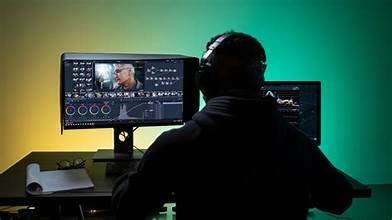In today’s fast-paced digital world, video editing has evolved into one of the most essential skills in the creative and tech industries. As content consumption continues to rise, particularly through video platforms like YouTube, TikTok, and Instagram, the demand for skilled video editors has never been higher. In this article, we will explore the significance of video editing as a skill, how it relates to future skills, and how mastering both can elevate your career prospects.
What is Video Editing?
Video editing involves manipulating and rearranging video footage to create a coherent and polished final product. This could involve cutting scenes, adding effects, enhancing sound, and even changing the pace of a video to convey the intended message effectively. Video editing is used in a wide variety of fields, including film production, advertising, online content creation, and even in business marketing strategies.
Modern video editing tools like Adobe Premiere Pro, Final Cut Pro, and DaVinci Resolve have made it easier for both professionals and amateurs to work on high-quality video content. With features like color grading, motion graphics, and sound design, the possibilities for video editors are endless.
The Growing Importance of Video Editing
Video is increasingly becoming the dominant form of content across all social media platforms. According to statistics, over 80% of internet traffic is projected to come from video content by 2027. As a result, companies and brands are investing heavily in video production, making video editing a crucial skill in today’s content-driven economy.
Furthermore, the ease of creating and sharing videos online has democratized the field, allowing anyone with a smartphone and a basic editing app to produce professional-looking content. However, to truly stand out in the competitive world of content creation, mastering the art of video editing is essential.
Video Editing as a Future Skill

In the context of future skills, video editing is not just about technical proficiency with editing software. It’s about understanding how to leverage this skill to create content that resonates with modern audiences. The rise of AI, automation, and smart tools has transformed many industries, but video editing remains a uniquely human skill, driven by creativity, emotion, and storytelling.
The world of video editing is evolving rapidly, and to stay relevant, aspiring video editors must keep up with new trends and technologies. This includes staying up-to-date with the latest editing software, understanding how to use AI-powered tools for faster editing, and mastering visual effects (VFX), 3D modeling, and animation techniques. These evolving skills will give video editors a competitive edge in a future dominated by ever-evolving digital media.
How Video Editing Is Shaping Careers
As businesses continue to recognize the power of video, the demand for skilled video editors is growing across industries. From social media influencers to marketing agencies and media production companies, there are endless opportunities for those who are proficient in video editing.
In addition, the rise of remote work and online content creation has opened up new avenues for video editors to work as freelancers. Platforms like Fiverr, Upwork, and Freelancer allow individuals to showcase their editing skills and take on projects from around the world, thus giving them access to a global market.
As more and more businesses shift towards digital marketing, video content creation is becoming an essential component of their strategy. Whether it’s creating tutorial videos, promotional content, or advertisements, video editors are in high demand to craft professional, high-quality videos that leave a lasting impression.
Mastering Future Skills in Video Editing
While video editing is undeniably a valuable skill, it’s also important to understand how it fits into the broader landscape of future skills. These are the skills that will define the workforce in the coming years and include both technical skills and soft skills.
For instance, video editors must be proficient in using editing software, but they also need to have a deep understanding of storytelling, pacing, and audience engagement. Understanding these elements will allow video editors to create content that not only looks good but also connects with the target audience emotionally.
Moreover, with the rise of future skills like artificial intelligence and augmented reality (AR), video editors should familiarize themselves with how these technologies are impacting video production. AI tools are already being used to automate tasks like color correction, sound editing, and even content creation. By embracing these technologies, video editors can work faster, smarter, and more efficiently, allowing them to focus on the creative aspects of their work.
The Role of AI in Video Editing
One of the most significant technological advancements influencing video editing is artificial intelligence (AI). AI-powered tools can analyze footage, suggest edits, and even help create content by automatically adjusting color, contrast, and brightness. AI can also be used to track objects and faces in video, which is especially useful in large-scale projects where manual tracking would be time-consuming.
Additionally, AI tools can help automate repetitive tasks like transcribing audio, adding captions, and syncing audio with video, freeing up video editors to focus on more complex tasks like editing storylines and refining visuals. AI is not meant to replace the human element in video editing but rather to enhance it by streamlining the process and improving workflow.
Learning Video Editing for the Future
For anyone interested in building a career in video editing, there are several steps to take to master the skill and future-proof your career. Here’s a roadmap to help you get started:
-
Learn the Basics: Familiarize yourself with basic editing techniques, such as cutting, trimming, and merging video clips. Understand how to work with transitions, sound, and visual effects to enhance the video quality.
-
Master Editing Software: Invest time in learning industry-standard editing software, such as Adobe Premiere Pro, Final Cut Pro, or DaVinci Resolve. These tools offer extensive features for professional-level editing.
-
Explore Advanced Techniques: As you gain confidence, explore advanced techniques like color grading, motion graphics, and VFX. Learning these skills will set you apart in a competitive job market.
-
Stay Updated with Trends: The video editing landscape is always evolving, so it’s crucial to stay updated with new tools, trends, and technologies. Follow industry blogs, attend webinars, and participate in online communities to keep learning.
-
Develop Soft Skills: Beyond technical abilities, soft skills like communication, creativity, and adaptability are essential for video editors. These skills will help you work effectively with clients and collaborators and stay ahead of industry trends.
-
Experiment with AI Tools: Embrace AI tools that enhance video editing workflows, such as automatic footage analysis, AI-based effects, and content suggestions. Learning how to use these tools can save time and improve the quality of your edits.
Conclusion
Video editing is an ever-evolving skill that continues to shape the digital landscape. By mastering video editing and incorporating future skills such as AI and advanced editing techniques, video editors can stay relevant and competitive in the rapidly changing job market. Whether you’re looking to work in media production, marketing, or content creation, developing these skills will give you a significant edge in the future of work.
Investing time and effort in learning video editing and future skills will not only open up new career opportunities but also position you as a valuable asset in any creative team. With the world becoming increasingly video-centric, the ability to edit compelling, engaging video content will be one of the most sought-after skills in the digital era.


